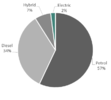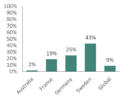Value Collector
Have courage, and be kind.
- Joined
- 13 January 2014
- Posts
- 12,263
- Reactions
- 8,524
Yes, but none of us have 360 degree vision for example, where my Tesla can see 360 degrees, our genetic diversity doesn’t come close to allowing any of us to be perfect, automated systems that fill in those gaps are great.But we also have genetic diversity, not all humans are alike, otherwise we would all be in jail, or there would be no jails.
But anyway my point is that an autopilot system with a human back up, is always going to be safer than the human alone, there a numbers backing this up, that’s why planes have autopilot to begin with.





